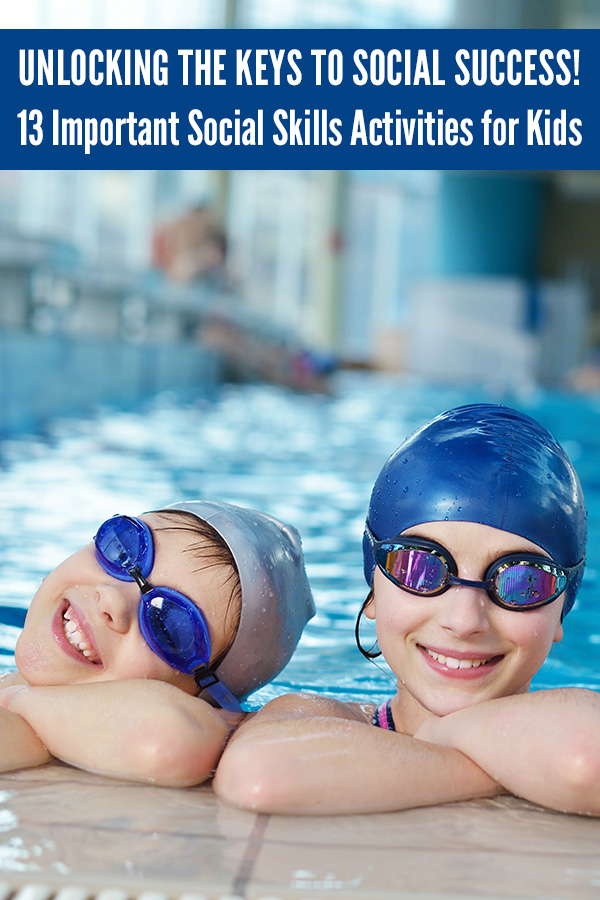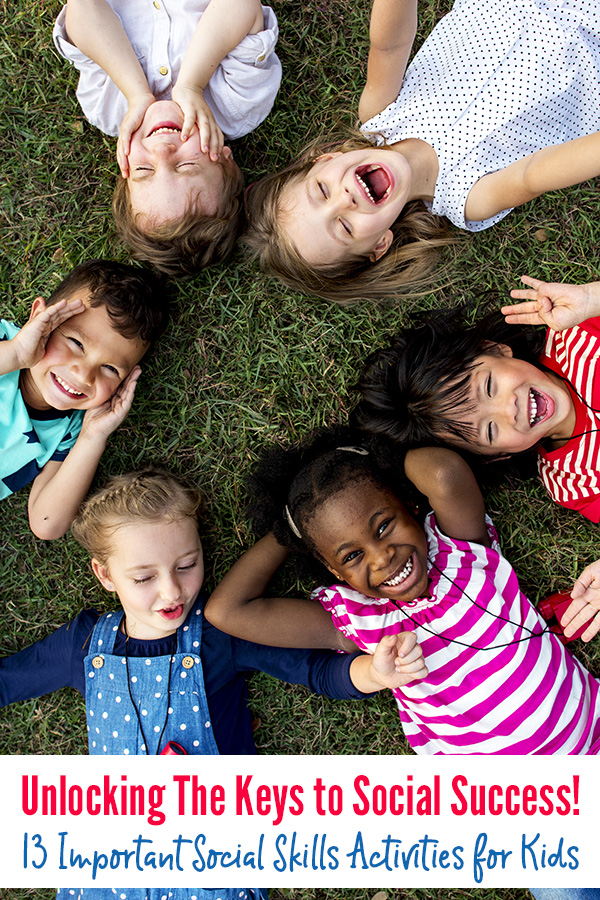Unlocking The Keys to Social Success! 13 Important Social Skills Activities for Kids
Hands-on social skills activities for kids of all ages.
Yesterday my heart was full of pride! My eight year old had his first swimming carnival. He does well in small groups but usually shies away from larger social situations. We have worked on social skills and social confidence a lot since he started school and yesterday he blew my mind.
In a totally new social setting, with a crowd of parents, school kids and teachers watching, with excited kids chanting and honking on trumpets, he approached the teacher by himself to say his name, age and team. He waited until it was his turn, looking super confident and composed.
He jumped in the pool for a 50-metre race and swam so hard. At the end, he was exhausted but thanked the teacher who helped him out. He didn’t win, but he didn’t care. I was so proud that he had the guts to have a go and try his hardest in this loud, crazy, overwhelming, new social setting. When I spoke to him he gave me a hug and said how scared he was, and yet he composed himself, used his manners, tried his hardest, followed social cues, stayed in charge and did it all on his own. That’s a huge win in my book.
Self-confidence in social situations is something many parents wish for their children. I can not tell you how much seeing my child take on the world as a confident and socially capable child filled my heart with pride.
Whether your child is an extrovert or an introvert, learning to be confident across a range of social situations is something that develops with time and experience. It is however possible to support your child’s social skills learning. By explicitly teaching social skills and engaging in social skills activities with your kids, you can provide them with important life skills that increase their social competence and confidence in new social settings.
What actually are social skills?
Social skills are skills and behaviours we use each day in our interactions with other people. They include communication skills (both verbal and non-verbal), an understanding of behavioural expectations across a range of social settings, and knowledge of societal rules (both explicit and implied) of interpersonal communication.
When thinking about these skills in the context of our children’s learning it can be helpful to break them down to include the ability to – speak and listen effectively, to engage others in conversation, to share, to be kind, helpful, empathetic, inclusive and complimentary, to be assertive without being bossy, to be positive or optimistic, to know how to join and be part of a group, to have good manners, to remember and follow the rules within a range of social situations.
13 Social Skills Activities for Kids
Knowing your child has a solid foundation of social skills to build upon can be both reassuring and rewarding. There are many ways we can support effective social development with children of all ages and the following social skills activities are equally relevant to learning at both home and school.
1. Effective Communication: Support the development of social skills by encouraging your child to engage in conversation. Conversation helps develop expressive and receptive language (listening and comprehending) skills and these are obviously key in the majority of our social interactions. Invite them to practice on family members, friends and other adults they are comfortable with. Encourage them to make eye contact, ask questions, listen to answers given, and to look for opportunities to continue the conversation through further questioning. Check out this collection of 12 games that encourage effective communication.
2. Model Positive Social Skills: Monkey see, monkey do! One fun way to model social skills is with soft toys or hand puppets. You can demonstrate a range of skills including manners, being friendly, following social cues, conversation starters and how to manage negative people or bullies. Find out more about using puppets to teach social skills.
3. Role Play: Similarly, role play can be an effective learning tool for breaking down or rehearsing a diverse range of social situations or social standards. For example, with older children initiate role play by saying “Let’s pretend (or practice) what you would say to the lady serving at the canteen. Pretend I am the lady… How can I help you today?” The playful nature of role play makes it a powerful learning tool for teaching social skills.
4. Use Story Stones to Develop Vocabulary: We often use story stones to build on my daughter’s vocabulary and conversational skills. Story stones can be used in lots of different games that help children develop the vocabulary for improved communication. Here are six ideas for playing with story stones.
5. Develop Emotional Awareness: Having good emotional awareness is a beneficial social skill for children to develop. As emotions are at the core of communication, when children are emotionally aware of themselves and others, social interactions are more meaningful. Here are 9 suggestions for developing emotional awareness through play.
6. Develop an Emotions Vocabulary: Use emotions games to help your child develop a specific vocabulary about a wide range of emotions and how they feel. Playing Games with these Emotions Matching Cards, having fun with our Big Emotions Jenga, and playing the Talking Emotions Card Game (great for older children) all provide fabulous opportunities for vocabulary development.
7. Develop Empathy: Learning to see things from another person’s perspective helps children learn to understand the feelings and emotions of other and to be more kind. See our list of tips for developing empathy.
8. Emphasise the importance of genuine friendships: In social settings such as school, social interactions and friendships can become complicated and aren’t always positive. The ability to form genuine friendships, to identify the qualities that make a good friend and to be a good friend are important skills to foster through regular discussion and reflection.
9. Play Board Games and Card Games Regularly: Playing board games helps reinforce learning about turn taking, and supports children as they learn the importance of being gracious winners and losers. Here are our top 25 board games for families.
10. Play Active Games Too: Playing active games such as Red Light Green Light, Scarecrow Tag, What’s the Time, Mr Wolf? and Please Mr Crocodile help children to learn self control.
11. Group ‘Work’: Providing children with regular opportunities to work and play together is an important piece of the social skills puzzle as it allows them to actively put the skills they are learning into practice. At school, this would include small group work experiences across a range of learning areas and in a variety of teams. At home, parents can create opportunities for play dates and involvement in extra curricular activities.
12. Use Books as a Tool: Books are one of my favourite tools for exploring social and emotional themes with kids. They provide information for children in a format that is easily understandable to them, as well as characters and life situations/circumstances that children can relate to. Books are also the most wonderful prompts for further discussion about a particular skill, behaviour or topic. Here are some themed booklists related to social skills that you might find helpful;
- Books That Celebrate Individuality & Diversity
- Fabulous Books About Feelings & Emotions
- Books for Kids (of All Ages) Who Worry A Lot
- Books About Friendship
- Books About Sibling Relationships
13. Encouraging Self Reflection: Especially important for older children, talking with your child about how they are doing socially is a topic to re-visit regularly. Teachers too have an important role to play in helping children reflect upon their friendships and social interactions, as so much of a child’s social experience happens at school. Touching base helps you, the adult, to see if and when difficulties are present so that you can support a child’s further development.
BONUS: Social Skills Activities for Children Starting School
Like my son at his first swimming carnival, starting school is a big social adjustment for young children. Below are a few additional social skill activity suggestions for children preparing to start school;
1. Work on listening skills: Great listening helps children do better in social interactions, both in the playground and in the classroom. Here is a fun emotional awareness listening game.
2. Provide opportunity for socialisation with children of similar age: You might consider enrolling your child in a part-time childcare program or preschool for the year before formal schooling begins. Alternatively, try a playgroup or a local community group that hosts group activities for children. Reach out to see if you can connect with the parents of children who will be attending the same school as your child to organise playdates. When it comes time to start school, having an already established social network will be beneficial in times of uncertainty.
3. Encourage Independence: Right from day one, school requires children to demonstrate a greater level of independence than previously expected of them. Class groups are larger, the number of adults is smaller, they have more space and less supervision. By helping your child learn to be more independent, you are supporting them to become more socially confident and more capable of adjusting to this strange, new setting. Work on independence with;
- Toileting: Encourage toileting alone, and in different bathroom settings. Don’t forget hand washing!
- Eating: Teach your child to open packets, containers and drink bottle by themselves. Eat recess (morning tea) and lunch at times similar to your school’s schedule to help establish a school-like routine prior to starting school.
- Dressing: This is not only great for school but will be a huge help in your day too. Being able to take shoes off and on, and fasten them, being able to put on and take off a jumper or jacket, and being able to change clothes if they have a toileting mishap are all useful skills to have prior to staring school.
- Self-care: Knowing when and how to use a tissue for their nose. Handwashing routine and frequency is important too.
- Looking after belongings: Being independent with their belongings will mean less time searching for hats, drink bottles, lunch boxes, etc and (hopefully) less misplaced items! Start getting your child into the habit of putting things into their bag when they’ve finished with them.
Do you have any additional ideas for helping children develop social confidence?


